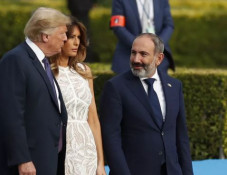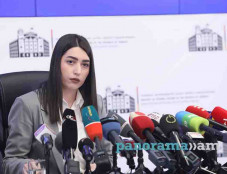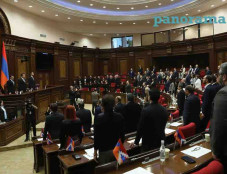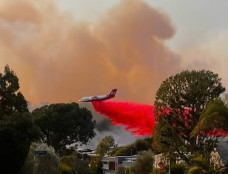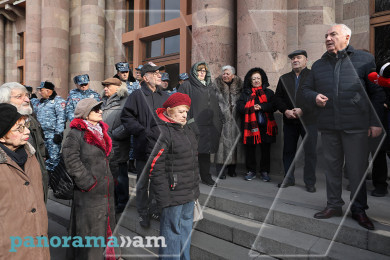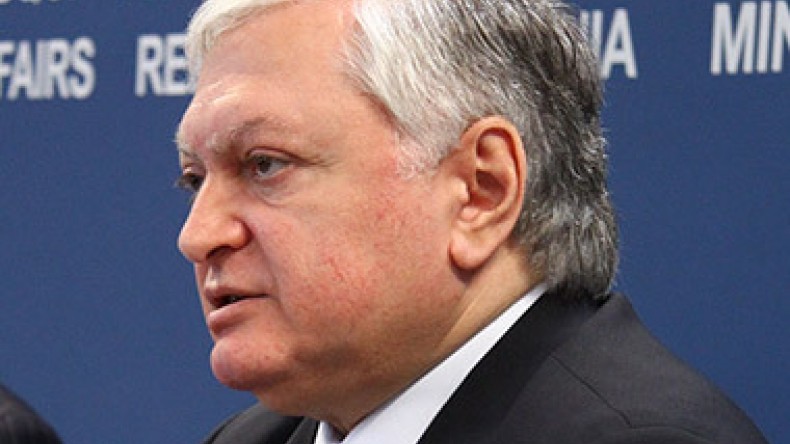
Nalbandian: First of all, Turkey has to reconsider what it has done wrong
Below we present Armenian Foreign Minister Edward Nalbandian’s interview to Slovenia’s Dnevnik daily.
Aleš Gaube: Your country is in a very interesting position in the Caucasus, Russia is Armenia’s biggest ally, and can you explain me how good ally for Armenia is?
Edward Nalbandian: Saying ally is meaningful, it means many things, means more than good, friendly relations. With Russia we have very strong historical links. Our friendship passed the test of time.
Aleš Gaube: I’m asking because Russia here in two different conflicts on your borders unresolved disputes …and approaches providing also arms sales to Azerbaijan – your de facto enemies, that’s why I’m asking how does this fact influence your relations with Moscow?
Edward Nalbandian: We would prefer Russia not to sell arms to Azerbaijan.
But we’re not asking friendly countries, partner countries to do something for Armenia against somebody else. What we are expecting concretely on Nagorno-Karabakh issue is not to support one side against the other, just to be in line with the position of the international community, expressed by the Co-Chairs of the OSCE Minsk Group. And Russia is one of the three Co-Chairs. Five statements on the Nagorno-Karabakh settlement were adopted by the Presidents of Co-Chair countries – Russia, the United States and France.
Our position is in line with those statements, with the proposals of the Minsk Group Co-Chairs. We welcomed all those five statements of the Co-Chair countries and said that we are ready to go to the settlement on the basis of three principles of the international law and the elements, proposed by them.
Aleš Gaube: Where has this conflict … or couple of decades, where hasn’t moved towards in the negotiations of the Minsk Group taking place for several years. Is it all in the interest of big powers that this territorial dispute in the Caucasus resolve?
Edward Nalbandian: I don’t think we have to blame big powers or small countries or anybody else. Over last six years three Co-Chairs have been working hard as mediators, they have organized around twenty Summits, several dozens of Ministerial meetings, they have made innumerable visits to the region.
One of the sides of the conflict – Azerbaijan, in reality is opposing the settlement on the basis of the proposals of the Co-Chairs. Azerbaijan is refusing all proposals on the conflict resolution and suggestions on confidence building measures.
Aleš Gaube: Is Azerbaijan in this case more powerful, is it more powerful because its energy capacities – gas and oil… ?
Edward Nalbandian: Azerbaijan is bragging about its power, but it is a big illusion. Country, which is preaching war, not peace couldn’t be powerful. Azerbaijan has increased military budget about 30 times in 10 years, has multiplied bellicose statements, hate speech, and regularly threatens to use force.
After all wars, sides have to return to the table of negotiations. but in worse conditions. We have a possibility to continue the negotiations together with three Co-Chairs. Why not to use this opportunity and this chance to move to the settlement, based on the proposals of the international community.
Aleš Gaube: Is it because of Nagorno-Karabakh that Armenia supported referendum of independence by Crimea?
Edward Nalbandian: If you mean the UN General Assembly resolution, we are not in favor of prioritising of one principle of international law over others. We couldn’t pretend that all principles of the international law are equal, but one of them is more equal than others. In any case, self-determination is the purpose of the Charter of the United Nations.
When the Co-Chairs are proposing three principles of the international law – non use of force and threat of force, territorial integrity and self-determination, Azerbaijan is picking up only one principle, that of territorial integrity, ignoring the other two. This approach can not lead to a solution.
Aleš Gaube: Since annexation of Crimea last year the West and Russia are stuck in new Cold War – how the relationships are now described – Does this new Cold War affect your country? Do you have to choose between the friends?
Edward Nalbandian: I do not think that problems between Russia and other countries could be in the interest of anybody – Europe, the United States, Russia and other countries. The confrontation is not the best way to find solutions. All problems can be solved through dialogue, negotiations, and that is why we were among the first who welcomed Minsk 1 and Minsk 2 agreements.
Aleš Gaube: If I return.. But you have to choose, actually, among friends. Last year was very unexpectedly that Armenia scrapped the association part of the European Union for joining the Eurasian Economic Union, which is considered as tool of Vladimir Putin to maintain a grip on the countries of former Soviet Union?
Edward Nalbandian: Maybe you are not aware, but Armenia before expressed many times its interest to join the Customs Union, Eurasian Union. We made it public through several statements by the President, Prime Minister, Foreign Minister. Simply Armenia was not invited to be the part of Customs Union. Since it was explained that we have no common border with the Customs Union member-states.
A Special Working group was created with the participation of the Armenian Government, Eurasian Union Commission representatives, which came to the conclusion that, it is possible to become a member of the Customs Union and then of the Eurasian Union without common borders. After this conclusion, in September 2013 we confirmed our will to join the Union. We adopted the roadmap and started negotiations from the beginning of the last year. We completed negotiations and became a member of the Eurasian Union since January of this year.
Aleš Gaube: Are you satisfied with first results of… ?
Edward Nalbandian: Only two months have passed. Membership in the Eurasian Union has important strategic significance for Armenia. It enables us to have facilitated access into protected markets of goods, united market of services of Eurasian Union, to attract investments, to have access to resources, to the transport corridors, to have free movement of goods, capital, services and people. I am not an expert in that field, I am not an economist, but the advantages are apparent.
Aleš Gaube: Final outcome of the Eurasian economic union should be free trade agreement with European Union? Do you see this happening in the perceiving future concerning, regarding the political difficulties between Russia and the European Union?
Edward Nalbandian: I think it is possible maybe not today or tomorrow, but certainly later, because this is in the interest of all countries of this wider area. The idea of common security and economic space, free trade area from Lisbon to Vladivostok is not a new one and was raised in different capitals. I think it is in the common interest to realise it.
Aleš Gaube: South Caucasus was always considered to be .. of different relations and … amongst big powers. Just today United States announced that 3000 soldiers Baltic states to deter Russian aggression. Do you think that some similar intervention of United States could happen also in Caucasus region?
Edward Nalbandian: There is no need of presenting things from the confrontational perspective and I am not looking on the developments in this region from this angle.
Aleš Gaube: I am asking because I am trying to find out what your concerns are maybe afraid of militarization of the region.
Edward Nalbandian: The main threat to the security and stability of the region is Azerbaijan – country, which increased its military budget from 163 million to almost 5 billion dollars in 10 years, country which is threatening to use force, country which is constantly making belligerent statements, propagating hate speech. This is the real threat. And we have to think how to address it, to find peaceful and negotiated solutions to the existing problems in the region.
Aleš Gaube: Are you focusing now more on resolving of the Nagorno-Karabakh issue or trying to open up again the borders with Turkey? Last time, it coincided a little bit and then both solutions got stalled?
Edward Nalbandian: That was the initiative of our President to start negotiations with Turkey, aimed at the normalization of relations without preconditions. Before it our relations were in a deadlock. Our President invited President Gül for a soccer match in Armenia. This initiative became known as “Football diplomacy”. We conducted very intensive and tough negotiations and came to the agreements. We signed two protocols in Zurich in October 2009. But Turkey was not able to ratify and implement them. Turkey failed to respect the principle of pacta sunt servanda. And that’s why the international community – many countries of the world – said the ball is on the Turkish court.
Turkey returned to the language of preconditions, trying to link Nagorno-Karabakh conflict settlement with Armenia-Turkey normalization. Many countries underlined that attempts to link the two issues could harm both processes. One of the old Turkish preconditions, reanimated after Zurich was related to the Armenian Genocide recognition. But Armenia unequivocally said and repeated: we will never question the reality of the Armenian Genocide and the importance of its international recognition and condemnation.
Aleš Gaube: Just the last question. Can Russia help you as a good friend of Turkey to again put this dialogue on a passed phase?
Edward Nalbandian: First of all Turkish Government has to be friend of the Turkish people to act in the interest of its people. Do you think that the normalization of Armenian-Turkish relations is more in the interest of any other country than Turkey and Armenia? Of course, this is in the interest of Armenia, in the interest of Turkey, in the interest of our region.
But, unfortunately, Turkey did not have courage and wisdom to ratify and implement agreed and signed protocols. So this is not about waiting for anybody to play a role to push forward normalization of relations between Armenia and Turkey. First of all, Turkey has to reconsider what it has done wrong. Back then I had warned that with this approach of Turkey, their proclaimed policy of “zero problems with neighbours” would turn into “zero neighbour without problems”. Nowadays everyone is reaffirming this view.
Aleš Gaube: Thank you very much.
Edward Nalbandian: Thank you
Newsfeed
Videos





